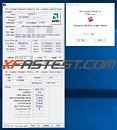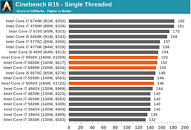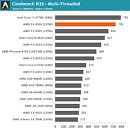Tuesday, February 21st 2017

AMD's Ryzen 7 1700X Glorious Benchmarks Leak; IHS, Pin Layout Photographed
Another day, another leak: the folks at XFastest have indeed been the fastest to leak images of an actual Ryzen 7 1700X processor, with pictures of the processor's IHS and pin area running rampant throughout the Internet (the Ryzen chip is located to the right in both pictures, with a sample of AMD's previous-generation FX CPUs on the left side for comparison sake).
While revealing shots may have their appeal, it's the benchmarking portion that most of us are expectant about. Until actual reviews are out, we're left nothing more than these leaks (which should be taken with appropriate amounts of salt). In this case, benchmarks of AMD's upcoming Ryzen 7 1700X have been released, showing just how the upcoming CPU delivers in 3D Mark Fire Strike, CPU Mark and Cinebench R15.Let's take it from the top: on Fire Strike's Physics test, the Ryzen 7 1700X scores a grand total of 17,916 points. CPU-Z screenshots running alongside the completed benchmark show us a 3.89 GHz clockspeed (up 400 MHz from the chip's base speed, at 3.4 GHz). The multiplier is set at 39x (4 units higher than the base 35x), though for now it is unclear if this was done through manual overclocking (remember, all Ryzen CPUs will come multiplier unlocked,) or through the chip's own XFR automated overclocking.
I'll go out on a limb here and say that this is XFR working as it should - remember, rated XFR speeds for the Ryzen 7 1700X are of 3.8+ GHz, meaning it can hit the mentioned 3.89 GHz by itself, provided sufficient cooling is at hand. CPU voltage in this test appears at 0.672 V. In this test, like in all others from this leak, the CPU was running with 16 GB of DDR4 memory running at 2132 MHz frequency.Moving on to the CPU Mark portion of the leaked benchmarks, we see a couple differences from the Fire Strike test. For one, the CPU clockspeed as reported by CPU-Z fell by 400MHz towards 3.49 GHz, with the multiplier taking a proportionate hit (35x). The voltage has also gone down though, from the previous 0.672 V to a more conservative 0.536 V - another circumstantial piece of evidence that we are looking at XFR toying with voltage and multiplier values. On this test, the 1700X scores 583 points.Now on to one of the kings on multi-threaded and single-threaded benchmarking: Cinebench R15. Here, the 1700X is shown as achieving 1537 points on the multi-threaded test, and 154 points on the single-threaded one. It is worth noting that Cinebench R15 reports the 1700X's base clock speed of 3.40 GHz, while again CPU-Z reports 3.49 GHz with a 0.672 V.Let me just take a slight tangent here whilst saying that this variation in clockspeeds and voltages is probably revealing of the leak's source screenshotting results after different time intervals have elapsed since a given test's completion. Soon enough for the clockspeeds to remain at the XFR frequency (Fire Strike's 3.89 GHz); when both clockspeed and voltage have already decreased (CPU Mark); and when the boost clocks decrease but voltage lingers (Cinebench R15).
Let's just take a little more critical approach regarding these Cinebench results; compare the 1700X's scores with these, taken from Anandtech:Some comments: AMD's 1700X achieves virtually identical scores to Intel's 6900K CPU on both tests (loses slightly on the multi-threaded test, but eeks out a win on the single-threaded one) once you take variabilty into account. We also can't forget how the test systems differ in terms of memory specs and all those other small things, which still end up affecting the final score. Whether you think this variability favors AMD's 1700X or Intel's 6900K in this particular scenario, there is one thing variability can't account for: the 55 W difference between rated TDP on AMD's 1700X (95 W) and Intel's 6900K (140 W).
Another thing that can't (apparently) be denied is the enormous leap in performance compared to AMD's now defunct Bulldozer architecture (and later refinements). The 1700X at 95 W TDP scores the vaunted 40% more in the single-threaded test than AMD's FX 9590 running at 5 GHz and at 220 W (!!) TDP, with 154 points against the FX 9590's tiny 110. This, allied to the 1700X's use of SMT with its 16 logical threads, also helps put into perspective how AMD managed to achieve a 111% boost in the multi-threaded score compared to the FX 9590 (1537 on the 1700X, 728 on the FX 9590). And this happens, again, despite the 9590 running at 4.7 GHz base and 5 GHz boost, whilst having a TDP rated at 125W more than the 1700X. You don't have to ask me for evidence. Look here:However one cuts this, these leaks (assuming they're remotely accurate) truly bring to light the enormous engineering challenge AMD had to surpass on its way to Ryzen: the enormity of the task for Jim Keller and company in bringing a competitive, efficient architecture to market despite AMD's inherent difficulties in funding, manufacturing... And on and on. That they managed to engineer an architecture such as this, which apparently gives Intel a run for its money even on the efficiency metrics, is nothing short of extraordinary. Add to that the potential for a many-core democratization even on the entry-level, and we could also see an important push towards more parallelized applications, taking advantage of 4-core solutions at the entry level, finally doing away with the overreaching dual core, four-thread CPUs that have more than outstayed their welcome.Source: Anandtech
Source:
XFastest
While revealing shots may have their appeal, it's the benchmarking portion that most of us are expectant about. Until actual reviews are out, we're left nothing more than these leaks (which should be taken with appropriate amounts of salt). In this case, benchmarks of AMD's upcoming Ryzen 7 1700X have been released, showing just how the upcoming CPU delivers in 3D Mark Fire Strike, CPU Mark and Cinebench R15.Let's take it from the top: on Fire Strike's Physics test, the Ryzen 7 1700X scores a grand total of 17,916 points. CPU-Z screenshots running alongside the completed benchmark show us a 3.89 GHz clockspeed (up 400 MHz from the chip's base speed, at 3.4 GHz). The multiplier is set at 39x (4 units higher than the base 35x), though for now it is unclear if this was done through manual overclocking (remember, all Ryzen CPUs will come multiplier unlocked,) or through the chip's own XFR automated overclocking.
I'll go out on a limb here and say that this is XFR working as it should - remember, rated XFR speeds for the Ryzen 7 1700X are of 3.8+ GHz, meaning it can hit the mentioned 3.89 GHz by itself, provided sufficient cooling is at hand. CPU voltage in this test appears at 0.672 V. In this test, like in all others from this leak, the CPU was running with 16 GB of DDR4 memory running at 2132 MHz frequency.Moving on to the CPU Mark portion of the leaked benchmarks, we see a couple differences from the Fire Strike test. For one, the CPU clockspeed as reported by CPU-Z fell by 400MHz towards 3.49 GHz, with the multiplier taking a proportionate hit (35x). The voltage has also gone down though, from the previous 0.672 V to a more conservative 0.536 V - another circumstantial piece of evidence that we are looking at XFR toying with voltage and multiplier values. On this test, the 1700X scores 583 points.Now on to one of the kings on multi-threaded and single-threaded benchmarking: Cinebench R15. Here, the 1700X is shown as achieving 1537 points on the multi-threaded test, and 154 points on the single-threaded one. It is worth noting that Cinebench R15 reports the 1700X's base clock speed of 3.40 GHz, while again CPU-Z reports 3.49 GHz with a 0.672 V.Let me just take a slight tangent here whilst saying that this variation in clockspeeds and voltages is probably revealing of the leak's source screenshotting results after different time intervals have elapsed since a given test's completion. Soon enough for the clockspeeds to remain at the XFR frequency (Fire Strike's 3.89 GHz); when both clockspeed and voltage have already decreased (CPU Mark); and when the boost clocks decrease but voltage lingers (Cinebench R15).
Let's just take a little more critical approach regarding these Cinebench results; compare the 1700X's scores with these, taken from Anandtech:Some comments: AMD's 1700X achieves virtually identical scores to Intel's 6900K CPU on both tests (loses slightly on the multi-threaded test, but eeks out a win on the single-threaded one) once you take variabilty into account. We also can't forget how the test systems differ in terms of memory specs and all those other small things, which still end up affecting the final score. Whether you think this variability favors AMD's 1700X or Intel's 6900K in this particular scenario, there is one thing variability can't account for: the 55 W difference between rated TDP on AMD's 1700X (95 W) and Intel's 6900K (140 W).
Another thing that can't (apparently) be denied is the enormous leap in performance compared to AMD's now defunct Bulldozer architecture (and later refinements). The 1700X at 95 W TDP scores the vaunted 40% more in the single-threaded test than AMD's FX 9590 running at 5 GHz and at 220 W (!!) TDP, with 154 points against the FX 9590's tiny 110. This, allied to the 1700X's use of SMT with its 16 logical threads, also helps put into perspective how AMD managed to achieve a 111% boost in the multi-threaded score compared to the FX 9590 (1537 on the 1700X, 728 on the FX 9590). And this happens, again, despite the 9590 running at 4.7 GHz base and 5 GHz boost, whilst having a TDP rated at 125W more than the 1700X. You don't have to ask me for evidence. Look here:However one cuts this, these leaks (assuming they're remotely accurate) truly bring to light the enormous engineering challenge AMD had to surpass on its way to Ryzen: the enormity of the task for Jim Keller and company in bringing a competitive, efficient architecture to market despite AMD's inherent difficulties in funding, manufacturing... And on and on. That they managed to engineer an architecture such as this, which apparently gives Intel a run for its money even on the efficiency metrics, is nothing short of extraordinary. Add to that the potential for a many-core democratization even on the entry-level, and we could also see an important push towards more parallelized applications, taking advantage of 4-core solutions at the entry level, finally doing away with the overreaching dual core, four-thread CPUs that have more than outstayed their welcome.Source: Anandtech









115 Comments on AMD's Ryzen 7 1700X Glorious Benchmarks Leak; IHS, Pin Layout Photographed
1 79068 ASRock X370 Gaming K4, AMD X370, S AM4, DDR4, SATA3, M.2 (PCIe/SATA), 2-Way SLi/CrossFire, Intel GbE, USB 3.1 A+C, ATX £126.24 £151.49
Deliver to:
Birmingham
GB
Totals:
Sub Total £451.23
Carriage £0.00
VAT £90.25
Total £541.48
I know I am an idiot but I have a good feeling about this, if I will not be impressed I will return it.
I´m loving to read this AMD fanboys posts all over the web, just shows how biased people are :D
Congrats to AMD! They could (finally) do what was already done by other brand. "Supa Doopa Evolution".You didn´t read what I said. A 7700k gets 4,8ghz on air easily, some chips get 5ghz if you check the forums. Do you really think that if Ryzen needs 1,82v to do 5,2ghz with LN2, that it will clock at 4,8ghz? Keep dreaming. You will get something in the likes of 4,2ghz to 4,4ghz and also with way slower ram as we already seen AM4 ram speeds are not that strong.
A 7700k at 4,8ghz + 4133mhz DDR4 will completly obliterate Ryzen in gaming tasks. Ryzen will obliterate 7700k in multi threaded software/work. But as I said in the first place, I´m a gamer and I want the best chip for... gaming. Don´t care about brand or price ratio, I want the best for my needs. Not everyone builds a PC on a budget. And I game on a 240hz monitor so I need all possible FPS.
Strange i don't see any of those games even near 240 fps.
We'll see if in real life 1800X actually beats i7-6900K - if yes, great. Intel will have to cut the prices at last.
But what happened with the Ryzen 1700? We're after weeks of leaks and discussions that Ryzen will be much cheaper, but AMD aligned this CPU with i7-7700K.
The price is almost identical... While AMD includes a cooler, it's not really a model designed for OC, which a user would need to actually beat an overclocked 7700K.
So yeah... I'm kind of disappointed. People started to compare Ryzen to legendary Athlon - coincidentally (or not?) also named 1700 - but it doesn't seem that way at all (and I've actually had an Athlon 1700+ ;)). Athlons offered the same performance Intel did at the time, but sometimes for almost as little as half the price. At that time AMD not only matched Intel's architecture, but was actually leading with innovations - e.g. with consumer-grade 64-bit.
I'm glad we're once again getting a market with 2 equally advanced manufacturers, but possibly nothing more - nowhere near what we've seen in all the hype lately. :(
And I hope AMD is already thinking about refinement (and the Ryzen 3 and 5 are great), because at this point they've reached (maybe beaten) a polished 3-year-old Broadwell architecture. Intel was not sleeping in the meantime and should also show a significant IPC gain in 2017 (and Optane might also change the situation).
You might want to compare the 1400X @ $199 to the 7700k @ $350. You'll give up some clocks and IPC but the question is going to be, Is it $150 worth ? That's 3/4th of another chip or $150 you can add to a GPU upgrade.
*See for yourself: www.techpowerup.com/reviews/Intel/Core_i7-7700K_vs_6700K_Game_Performance/25.html
The "is it $150 worth?" is a good point. We don't know. We've learned nothing about the cheaper Ryzen variants.
The "3/4th of another chip" is a bit like "free 3rd shoe", but the GPU argument is valid.
For me this would be an easy choice: a better GPU will not compensate the loss of CPU power (especially single-core performance), because I'm mostly CPU dependent.
Looking at the way iGPUs improve and my need for them decreases over time, my next discrete GPU (choosing between 1050ti and 1060) might as well be the last ever. But single-core CPU performance is so easy to utilize it'll always be my priority.
For others... that depends. Ryzen is a product designed for hardcore gamers, which is a tiny group on the whole market. They'll have to choose based on how high they value multi-core performance, e.g. how they use their PCs beside gaming. In machines built just for high resolution gaming Ryzen seems like an obvious choice (if the benchmarks are realistic).
Generally, because Ryzen lacks iGPU, it is going to be a niche product - far less important to the whole PC market than AMD tries to convince us. We'll see how next AMD APU peform, because that's were the money is (it should get similar IPC gain).
And of course CPU performance and practicality is a bit more than just benchmark numbers. We'll see how Ryzen finds itself in real-life tasks, which benefit not just processing power, but also instruction set, software optimization and so on.
Your fanboisim is showing through dude. Get some chill. If you had been here back in 2010's you would have known i had started off with an Athlon based PC.
Just pointing out that some things are so obvious but people like to run with them for their convenience. If people cant tell the difference when its being pointed out to them then they have bigger issues.
The one that made sense that was not included in the Presentation Stream was 7700k vs 1700 with "Twitch Streaming". 7700k 82% vs 1700 100%. That will be interesting once its independently tested.
2:00 mark
From what we've seen 7700K is much better in single-core tasks.I'd love to see how many cores were doing the encoding, because maybe AMD gave us a proof that 4 is enough for games. ;)
Honestly, game streaming as a form of CPU benchmark?
In one of the comments I said that I find Ryzen to be a very niche product, but this is just a whole new level of WTF. :)
Facts? CPU's aren't even out yet & you're claiming these facts? Lol okay... I'm not trying to convince you or anyone too buy this, do what ever you like but seriously stop sucking on Intel's corporate schlong, so obvious xD
www.computerbase.de/2017-02/cpu-skalierung-kerne-spiele-test/#diagramm-dishonored-2-fps
E.g. Excel's spreadsheet computations are beautifully parallelized, but VBA is single-threaded by design.
If I write the code myself and the language doesn't utilize multithreading automatically, I don't bother - it's to time consuming for ad-hoc programming.
2) Beside this computation stuff I do quite a lot of photo postprocessing and here - thanks to people at Puget systems - we can look at some actual numbers:
www.pugetsystems.com/labs/articles/Adobe-Lightroom-CC-6-Multi-Core-Performance-649/
As you can see Lightroom is pretty much insensitive to anything above 4 cores, where the jump from 3 to 4 is already marginal.
Facial recongnition is a good example of a single-thread algorithm, so there is no gain in multicore systems. Adding second core simply makes it possible to have one thread exclusively for the computation task.
But even in something like batch file conversion (80 files) Lightroom will benefit just from 4 threads (while in theory it could just give 1 file to 1 thread and have linear improvement).
So how much of mainstream software is actually optimized for >4 threads? We don't know, but possibly not much. I've seen a few more tests like this one and they had similar results (also for popular consumer/pro software).
Keep in mind the most popular CPUs are Intel's i3, i5 and mobile i7-xxxxU - all have 4 threads. That's what software developers are targeting.
1) your "single threaded by design" CPU heavy VBA code that you regurarly execute runs faster
2) you code some perf heavy stuff that you regularly execute
3) last but not least, because there is laughable article on the internet that checks how much faster an image file is read from an USB drive, with more cores
Did I miss anything?
With Ryzen I can encode AND play a game at the same time. I find that advantageous. Sure, I could run the encode on one of the many other PCs...but I'm too lazy to file transfer lmao.
One of the best uses for AMD was cheap multithreading. Single core perf is meh buti t gets the job done. The ability to actually multitask is liberating.
Also on AMDs release they showed a Setup running DOTA2 while streaming at the same time. No frames were dropped in the stream! While the intel stuttered a bit.
Note that the intel system also had 2x the RAM.
As I've said: I prioritize single-threaded performance because of the tasks I perform.Laughable because?
Puget Systems is an acclaimed custom PC building company and I have no reasons to discredit their analysis - especially since I've seen similar results both on the web and in my work.
Yes, importing files from a USB drive is limited by the drive speed, but they tested it anyway. Why?
a) Because the purpose of the article was to go through a typical workflow and importing files is inevitable.
b) Because testing things that seem obvious is very important (also in more scientific problems). From time to time you'll actually get some interesting (unexpected) result.
Example from the text (which I've mentioned earlier): RAW->JPG conversion is fully parallelized (using as many cores as it can), but for some reason RAW->DNG doesn't benefit from more than 4.Possibly the fact that you asked me why I value single-threaded performance more and that's what I've been answering. However, you seem to think I generally underestimate multi-threading, which is not true ("fuck multithreaded performance"). :D
Multi-threading is very important in many computer tasks. I'm just pointing out that single-thread performance is more fundamental. There will always be some tasks that only utilize a single thread. Even if at some point in the future CPUs will have hundreds of cores (e.g. CPU and GPU will be unified), single-core performance will have to be on an acceptable level.